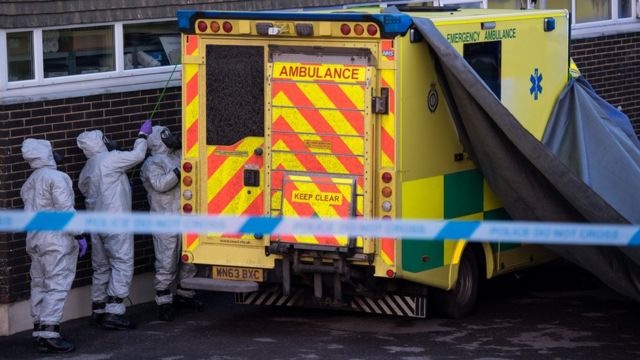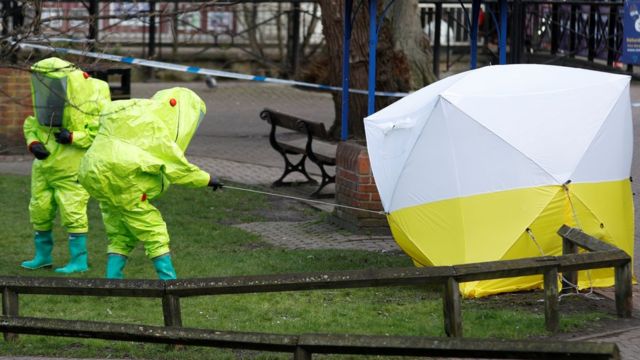The Skripals spent more than a month in hospital in Salisbury. Just a month ago, they were saying that “Novichok” would kill them or leave them disabled, but in the end, Yulia Skripal has already been released from the hospital and her father, double agent Sergei Skripal, is steadily recovering. Is that possible after being poisoned with a military-grade nerve agent? Britain has accused Russia of using chemical weapons in Salisbury and persuaded its allies, including the US, to expel dozens of Russian diplomats.
“Nonsense, rubbish and absurdity,” Russian President Vladimir Putin responded to these accusations, adding, “If it was a combat poison, of course people would have died on the spot.” They did not die, and on Tuesday, a doctor at the hospital from which Yulia Skripal had left for a “safe place” the day before recounted how the victims were treated in the most high-profile poisoning in Britain since 2006, when radioactive polonium-210 was used to assassinate former FSB colonel Alexander Litvinenko in London.
British toxicologists say that recovery from Novichok poisoning is quite possible if victims receive immediate qualified help. At the same time, they agree that the long-term health consequences for those poisoned can be serious. The hospital’s chief physician, Christine Blanchard, said they managed to rehabilitate the Skripals in three stages. This description is consistent with what British toxicologists say about possible treatments.

The military rushed Skripal to the hospital. “Poisoning does not have to be fatal. If treatment is started immediately, recovery from many things is possible,” chemist and forensic expert Michelle Carlin of Northumbria University told the Washington Post. “In the end, it was the excellent medical care that allowed Yulia Skripal to be discharged from the hospital,” said Alister Hay, honorary professor of toxicology at the University of Leeds.
In the human body, acetylcholine serves as a chemical transmitter (mediator) of nerve impulses to muscles, which is then rapidly broken down by the enzyme acetylcholinesterase. It is this enzyme that is targeted by nerve agents. In those affected by “Novichok”, acetylcholine is not destroyed, the neuromuscular chain goes into chaos and blocks vital muscle functions with spasms: breathing and heartbeat. So in the early stages – when unconscious people were found on a bench in a city park – the paramedics most likely used an anticonvulsant – a powerful sedative called diazepam, Professor Hay suggested. Having stabilized the Skripals in this way, doctors hooked them up to life support systems and proceeded to the second stage – administering a drug that blocks the receptivity of muscle receptors to acetylcholine and eliminates the problem until the body resumes production of new portions of the affected “Novichok” enzyme – acetylcholinesterase – and restores normal delivery of nerve impulses to the muscles.

The bench where the Skripals were found was covered with a tent. “We had to use a whole series of drugs to rebuild the patients’ bodies until they started producing new enzymes to replace the ones damaged by the poisoning,” Dr. Blanchard said. She did not mention the specific drugs. Professor Hay believes that among the drugs, atropine was certainly present. According to Chris Morris of the Toxicology Centre at Newcastle University, the Skripals are recovering even longer than usual, which may be due to the fact that they received a large dose of poison. “New research shows that in such cases, enzyme levels sufficient for acceptable nervous system function are restored within about two weeks,” he told Agence France-Presse. “Victims of nerve paralyzing poisoning usually recover fairly quickly if the cause is identified promptly and treatment is started without delay,” he said.
The third stage of treatment is to remove the remaining toxins from the body. Certain oximes – drugs that “detach nerve-paralyzing substance particles from the enzyme,” as Professor Hey explains – will be suitable for this purpose. “But we don’t know for sure which ones are most effective against Novichok chemicals. So they may have had to experiment with oximes,” he muses. Sometimes the body is able to go through this stage of recovery without outside help. It reproduces the affected enzyme, and in cases of serious infection, this process is accelerated as the organism tries to fully restore the enzyme, as it is under the threat of total deactivation. “In the end, the synthesis of the enzyme continues even after the nerve agent has been completely cleared from the body,” says Professor Hay, a member of the Advisory Board of the Organization for the Prohibition of Chemical Weapons. But enzyme restoration is only part of the job. “Very little is known about the long-term health consequences for those who have recovered from poisoning with ‘Novichok’, – says Dr. Karlin. – From history we know about damage to the nervous system. This could include cognitive impairment, motor dysfunction and respiratory problems”.

